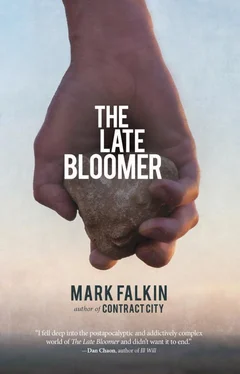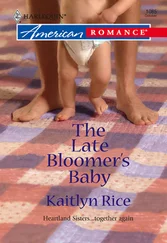I nodded.
Walking briskly to me, taking my elbow, she said, “We need information. We need to figure out what’s going on. We need to try to find others.”
“Food in the store,” I said. We headed toward the door, agreeing that we needed to get inside and think, get this spooky exposed feeling off of us.
We had walked into the shadow of the store when we heard a man’s voice behind us. “Hey! Stop!” The man in the big car that had struck the Hat Creek sign listed across Burnet, ran a tire up onto the curb, and came to a stop. His passenger window down, tinny music just discernable, his arm outstretched, fingers splayed like he’s drowning.
Which he was. Drowning on pearlescent crystalline stuff that looks like home insulation. It sparkled like fake snow through its sheen. I found myself glued to the cement. Kodie too.
“Help!” the man croaked. The whine of the old car’s door hinge. The radio jingle wafting across the lot to our ears, an Andrews Sister-like take on what to do when you need a sub sandwich. He had difficulty keeping the door open. He kept kicking it and it kept bouncing back and slamming closed. The jingle as background to his exit fit.
Under her breath, Kodie said, “Let’s hold here for a sec. See if we can help him.”
I didn’t respond, fixated on the man.
The man made his way around the front of the car, bumping his hip, his face locked onto ours even as he stumbled over the curb. Choking noises came from him, sputtered and popped.
“Help,” he scratched out. He lurched with one hand to his throat, one hand reaching out. You’d have thought the streets would be filled with such people, the near-dead stragglers choking and crying for help. Thing was, he’s the only person up and down Burnet.
“I’m going,” and I started jogging to the guy. I’m not sure why I headed for him. I couldn’t watch from afar. It may be my last chance to see it, I’d thought. Turns out, I was right.
I reached him as he fell to his knees and grabbed his throat with both hands now. His sweaty face turned magenta. His eyes bulged. Something popped. The noise cracked loudly enough to make me take a step back, like you would when a firework’s fuse has burned down but hasn’t gone off.
And that’s when the white cottony substance reared from his mouth, stopping at his lips. A ring of blood at the lips. Reminded me of the time Martin had me fill a few small holes in the wood around the house with that spray foam that puffs up and quickly hardens. On his knees, still just able to whistle in air, he looked like he’d just sprayed whipped cream into his mouth and was tasting it full and sweet before swallowing, that fun moment of being gluttonous and gross. I imagined him swallowing and wiping his mouth with his sleeve and exclaiming, ‘You try!’ The substance didn’t smell as it effervesced from the man’s throat. Coming from where? The stomach, the lungs? It was less bilious than airy. It seemed from those fractal bronchi, deep down beyond the microscope’s vision.
He shook his head back and forth and gagged, drool slinging, looking like a diseased farm animal in its last throes in the shadow of a barn, not here in the parking lot of a Dollar Tree in the up-and-coming Burnet Corridor (Martin calls it BuRo, like SoHo), his eyes not really looking at me anymore. He reached into his back pocket, yanked out his wallet, and with shaking fingers marbling from oxygen lack, he tugged out a photograph.
Kodie joined me, bumping me aside. “How can we help? Tell us how!”
His eyes wild, his pallor hectic, scarlet lips working around the full mouth and spreading teeth, he managed to force out in a wheeze, “Pluh… eeshe!”
She took the picture and wallet from him as he collapsed to his hands and knees. He shook his head back and forth with rigor now. I looked over her shoulder. The wallet photo depicted a little girl with a natural smile posing with her chin on her fist, her elbow propped on a mound of blue cloth drawing out her crystal eyes.
“Your daughter?” I spoke loudly to him with a hint of disbelief, his daughter’s beauty belying his homeliness. In my shock, I regarded this man as a specimen, not as a human to whom I could provide succor. Plus, I didn’t want to get within arm’s length of him. Arm’s lurch.
But Kodie did.
His face to the cement, I could see he nodded. She squatted down. I followed her lead. He managed to lift his head, his face meeting ours. “She’s here?” I took the wallet and flipped the flap up, showing the license through its window to him. His eyes swirled and rolled in their sockets and he coughed a cough that had nowhere to go, making his back recoil up into a hump where it stayed. He fell over. Upside down to us now, he pointed to the items in my hand, what was left of his life, and then his face froze and his arm fell.
We stared. Kodie, somehow burying her emotion, asked rhetorically if not clinically, “What is this in his mouth?” I shook my head. I couldn’t tell her I thought that some transmission issuing from a black zone between distant stars called forth a process by which from deep in the lungs arose an ancient death mold.
“Wants us to find his daughter.” I handed the picture back to Kodie. She inspected it, turned it over.
“Rebecca.”
“How old you think?” I asked.
“Five, six. Her cheeks still have that rounded baby fat look to them.”
The man’s open car door still chimed and from the radio blared an ad that required the trumpeting of the University of Texas fight song behind what sounded like ex-football Coach Mack Brown’s nasally voice.
The man’s throat looked solid now, the stuff looking as though it had hardened, forming a cylinder from mouth through the throat and down into his body cavity. You could hear a cracking sound, like ice solidifying, or bones splintering. His face had swollen in the minute we’d been standing here, the substance still expanding and hardening.
“We need to at least try,” she said. I thought of the little girl I’d left amid bus fumes. “Maybe she’s there.”
I looked at the license. “I know this street.”
“I do too,” she said. “It’s near your house.”
I inhaled a deep breath and felt the gun resist against my ribs. “My car.”
“She’s probably all alone. She could hurt herself.”
We didn’t go into the store. With this man dead before us, the notion of hunger didn’t exist.
“Where’d you get the bat?” We drove in my car to the address on the guy’s license. Lawrence Shields. DOB: May 16, 1969. DOD: minutes ago.
“Under my bed.” Kodie eyed the streaks of plane crash smoke in the sky.
“You looked pretty tough walking through the store with that bat. All one-woman wrecking crew.”
“Look at you.” She pulled back my shirt to display the gun. Her smile waned from her eyes before it did her mouth. “You have bullets for that?”
I nodded. “Need to probably get more though.” I banged my palm heel on the steering wheel. “I mean, can you believe this? My biggest worry, what? Two, three hours ago, was telling Martin about band and pot. Now I’m thinking I’m not nearly armed enough to drive through town. Funny, when the world was full of people I didn’t even think about such a thing. Now that there’s nobody left—”
“We don’t know that.”
“C’mon. You saw TV. You saw that guy just now.” I flicked the driver’s license against the wheel like a playing card.
“We don’t know that for sure. It’s a big world. Maybe there are big bands of people who went underground, were out on a remote island.”
“This isn’t a virus, not a chemical.”
“How do you know?”
“I don’t. Not for certain.”
“Then why do you—?”
Читать дальше












